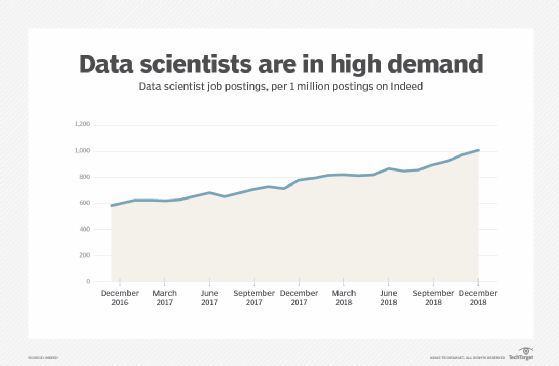
Sergej Khackimullin - Fotolia
3 ways the data scientist role benefits CX teams
CX teams don't traditionally include the data scientist role, but adding one can help derive more value from customer data than a CX analyst or canned analytics software can.
Customer experience must be a team effort. Enterprises that appoint a chief experience officer or chief customer officer are off to a good start, but a bigger team is more beneficial and can include a CX manager; an apps manager; analysts; a data scientist; and help from IT, sales, marketing and the service desk.
CX analysts cover a range of data-crunching tasks and are necessary for a well-designed CX team. Analysts gather and clean data from customer apps; monitor social media; and evaluate survey input for customer profile data, behavioral insight fodder and metadata to fine-tune CRM systems.
But including a data scientist role can derive even more value from data. Data scientists don't just use and maintain customer behavioral models -- they build new ones from scratch. And they don't just analyze and report on key metrics in the models -- they discover new ones. Ultimately, someone in a data scientist role can understand more of the math and methodology in enterprise analytics software.
Here are three strengths the data scientist role brings to a CX team over and above a data analyst or a canned analytics software package.
1. Discovering new factors and influences
The factors that move a noncustomer up the ladder to a loyal customer are well-understood -- teams already pay attention to those measures. But there are still unknown influences that attract customers.
Data scientists can search data to uncover the new products and services customers seek and add them to the CX team's toolkit.
2. Building new behavioral models
Customer behavior provides valuable data to adjust the models that help sales and marketing teams determine what steps to take next. But when businesses tap a new demographic, a new product or a new service that appeals to a new potential customer base or when the enterprise takes its offerings into a new vertical, new models are a necessity -- and data scientists can build, test and implement those new models.

3. Outperforming canned analytics
Regression models for descriptive and predictive tasks and cluster analysis for studying populations can help CX teams get the most out of data. But canned software only uses a handful of the mathematical tools and techniques available, which may not be the best solution for a particular situation. Data scientists can select the best method for a CX team's specific needs.
The CX data scientist doesn't need to be a designated role -- they can participate in CX projects on an as-needed basis.
Organizations might also consider hiring a data scientist consultant if one isn't available in-house and hiring one isn't in the budget. However, that consulting relationship should be long term: If the team is going to use this resource regularly, it's beneficial to stick with someone who knows the company and its customers.








